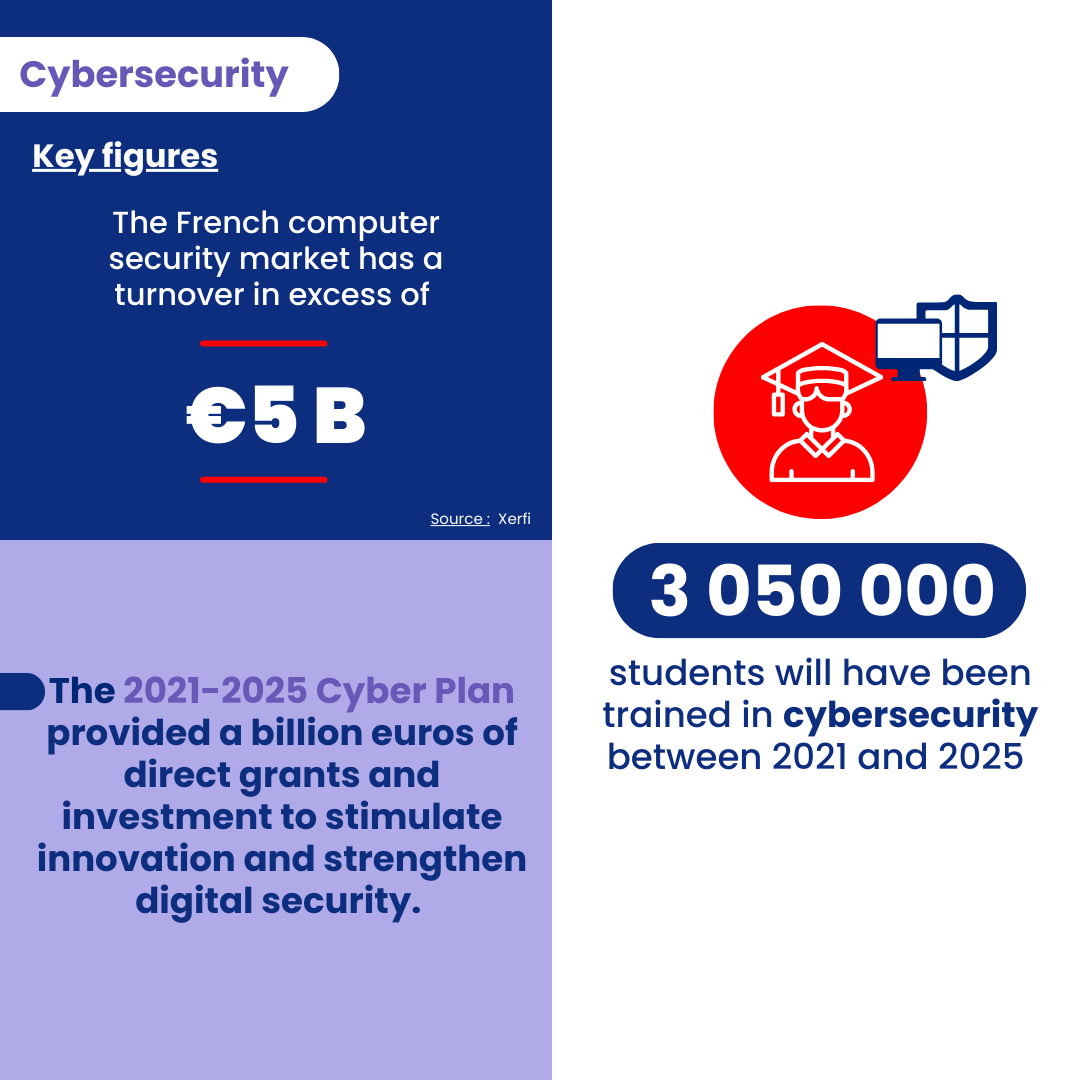France reaffirms its strategic position in the cybersecurity sector

An ambitious policy
France is one of Europe’s leaders in terms of cybersecurity, mainly thanks to the implementation of a solid legal and regulatory framework via initiatives such as the General Data Protection Regulation (GDPR), which reinforces the security of personal data. In addition, France hosts globally renowned cybersecurity events such as the International Cybersecurity Forum (FIC) in Lille, attracting experts and companies within the sector from across the globe. In 2023, the global cybersecurity market was valued at over 180 billion dollars, while the French computer security market had a turnover in excess of 5 billion euros, attracting a large number of players and investment in this sector.
France also provides the backdrop for some of Europe’s largest cybersecurity companies such as Thales, Orange CyberDefense, and Atos, all with a strong international presence. These companies play a key role in the provision of cybersecurity solutions for governments, companies and institutions. The government’s French Cybersecurity Agency (ANSSI) also plays a central role by providing companies with resources and directives, while at the same time working closely with public authorities.
As proof of the priorities afforded to this sector, in 2021 the government launched its billion- euro 2021-2025 Cyber Plan aimed at strengthening the country’s cybersecurity. It resulted in the creation of 50 consortiums and the hiring of 73 doctoral students and engineers as part of its priority equipment and research programme for cybersecurity. The government also introduced finance mechanisms to support cybersecurity start-ups and companies, such as the Cyber Booster start-up studio. This mechanism, unique in Europe, provides support to start-ups in the cybersecurity sector.
An ambitious cybersecurity innovation and training policy
As a result of its ambitious national strategy, the country is focusing on education and training in order to create the experts of the future. Specialist grandes écoles and universities such as INSA, ESIEA and the University of Paris Saclay are training high-level engineers, while ongoing training courses enable professionals working in the sector to keep up-to-date with the latest technological developments. Several research and development centres such as the National Institute for Research in Digital Science and Technology (INRIA) are global references in this field. In parallel, prestigious higher educational institutions such as the École Normale Supérieure (ENS) and the Université de Technologie in Troyes are training the cybersecurity talents of the future. Another example is the Campus Cyber at La Défense, which officially opened in 2022. Bringing together 160 French and international players and a total of 1,800 experts in the digital security sector, the campus encourages the implementation of research and development projects as well as the creation of the cyber unicorns of tomorrow.
Thanks to all these initiatives, France has positioned itself as a key player in the protection of digital infrastructures as well as an innovation and training hub for the future of cybersecurity.
Cybersecurity is “a key challenge for our sovereignty and a major economic opportunity for our entrepreneurs and our start-ups. As a consequence, we need to continue to develop this strategy and invest, alongside private entities within the French cyber ecosystem, in skills, training and companies within the sector.” Bruno Le Maire, former Economy, Finance and Recovery minister.

Cities at the cutting-edge of cybersecurity
Paris, Lille and Rennes play a major role in the development and consolidation of cybersecurity in France through a combination of innovation, training and collaboration with players in the public and private sectors.
The country’s capital and a major centre for technology, Paris is at the heart of the cybersecurity ecosystem in France. The city is home to an array of specialist companies, ranging from innovative start-ups and research centres to institutions such as the French Cybersecurity Agency (ANSSI).
Lille occupies a privileged place in the cybersecurity sector, in particular as a result of its central role in the development of innovative digital solutions. The city is the venue for the International Cybersecurity Forum, one of the sector’s most prestigious European events. Furthermore, Lille boasts a solid academic and research ecosystem through institutions such as Polytech Lille and the National Institute for Research in Digital Science and Technology (INRIA Lille – Northern Europe), one of France’s leading centres for cybersecurity.
Rennes is also a leading reference in the cybersecurity field, largely the result of its top-level university and research activities within the sector. The University of Rennes and the INRIA Rennes – Bretagne Atlantique are both heavily involved in advanced work in cybersecurity, cryptography, and network security.



